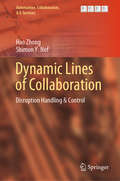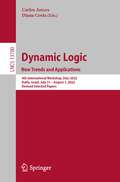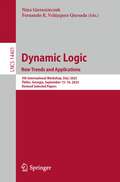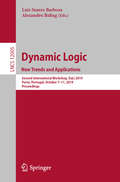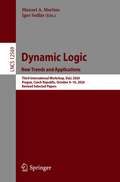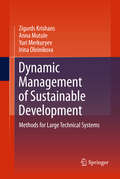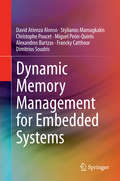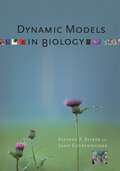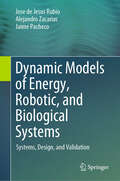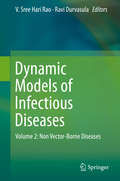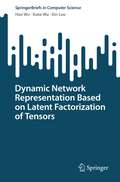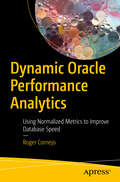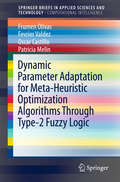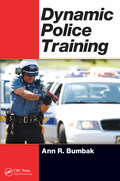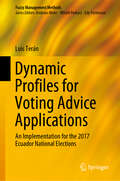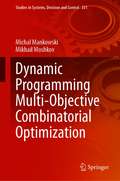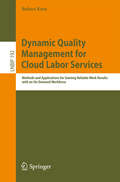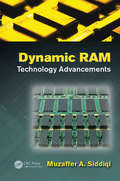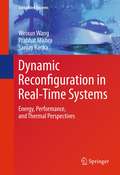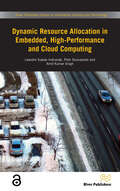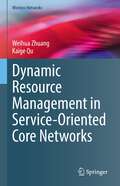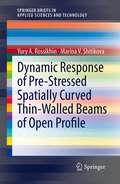- Table View
- List View
Dynamic Knowledge Interaction (International Series on Computational Intelligence)
by T. NishidaInternet, intranets, the Web, chat rooms, E-mail, and E-business. With the advent of this widespread networking, it is clear that the nature of human interactions is changing. As communities develop based on common knowledge, connections through traditional social routes are de-emphasized. Dynamic Knowledge Interaction presents groundbreaking, inte
Dynamic Lines of Collaboration: Disruption Handling & Control (Automation, Collaboration, & E-Services #6)
by Shimon Y. Nof Hao ZhongThis book focuses on the systematic modeling of complex situations characterized by escalating disruptions, and on cycles of dynamic collaboration for the best handling of disruptions. What can we do about disruptive events and their cascading effects? Thanks to the evolution of intelligent technologies for interaction, communication, sharing, and collaboration, cyberspace is a rapidly expanding world. Our systems of machines, software services, and human organizations have become increasingly interdependent, in other words – networked. As a result, disruptions that initially affect only a small part of any network tend to escalate. At the same time, cyber solutions can support first responders and emergency handlers, enhancing their responsiveness and ability to collaborate with one another in controlling disruptions and preventing their escalation. In this book, we are chiefly interested in how effectively these collaborations can be supported and how we can further optimize such support. Solution guidelines for optimizing collaborations are illustrated with examples in various application domains: agricultural robotics, civil cyber-physical infrastructure, visual analytics, manufacturing automation, and supply chains. Open-source simulation tools are also provided to supplement the main content.
Dynamic Logic. New Trends and Applications: 4th International Workshop, DaLí 2022, Haifa, Israel, July 31–August 1, 2022, Revised Selected Papers (Lecture Notes in Computer Science #13780)
by Carlos Areces Diana CostaThis book constitutes revised selected papers from the refereed proceedings of the 4th International Workshop on Dynamic Logic, DaLí 2022, held in Haifa, Israel, in July/August 2022.The 8 full papers presented in this volume were carefully reviewed and selected from 22 submissions. They deal with new trends and applications in the area of Dynamic Logic.
Dynamic Logic. New Trends and Applications: 5th International Workshop, DaLí 2023, Tbilisi, Georgia, September 15–16, 2023, Revised Selected Papers (Lecture Notes in Computer Science #14401)
by Nina Gierasimczuk Fernando R. Velázquez-QuesadaThis book constitutes the revised selected papers of the 5th International Workshop on Dynamic Logic. New Trends and Applications, DaLí 2023, held in Tbilisi, Georgia, during September 15–16, 2023. The 8 full papers in this book were carefully reviewed and selected from 10 submissions. They deal with new trends and applications in the area of Dynamic Logic.
Dynamic Logic. New Trends and Applications: Second International Workshop, DaLí 2019, Porto, Portugal, October 7–11, 2019, Proceedings (Lecture Notes in Computer Science #12005)
by Alexandru Baltag Luís Soares BarbosaThis book constitutes the proceedings of the Second International Workshop on Dynamic Logic, DALI 2019, held in Porto, Portugal in October 2019. The workshop was held in Porto, Portugal, on October 9, 2019, as part of the Formal Methods Week which hosted the 3rd World Congress on Formal Methods. The 12 full papers presented together with 2 short papers were carefully reviewed and selected from 26 submissions. The workshop is based on the project DaLí – Dynamic logics for cyber-physical systems: towards contract based design.
Dynamic Logic. New Trends and Applications: Third International Workshop, DaLí 2020, Prague, Czech Republic, October 9–10, 2020, Revised Selected Papers (Lecture Notes in Computer Science #12569)
by Manuel A. Martins Igor SedlárThis book constitutes the proceedings of the Third International Workshop on Dynamic Logic, DaLí 2019, held in Prague, Czech Republic in October 2020. Due to COVID-19 the workshop has been held online. The 17 full papers presented together with 6 short papers were carefully reviewed and selected from 31 submissions. The theoretical relevance and practical potential of dynamic logic is a topic of interest in a number of scientific venues, from wide-scope software engineering conferences to modal logic specific events. The DaLí 2020 workshop is exclusively dedicated to Dynamic logic and aims at filling this gap and creating a heterogeneous community of colleagues, from Academia to Industry, from Mathematics to Computer Science.
Dynamic Management of Sustainable Development
by Irina Oleinikova Anna Mutule Yuri Merkuryev Zigurds KrishansDynamic management of systems development is a precondition for the realization of sustainable system development. This approach allows for the usage of systems theory methods that take into consideration the interaction of decisions made over time and space. A characteristic feature of this kind of method is that the process of sophisticated object development over time is examined for optimal decision selection. This requires the application of modelling methods that represent properties of the developing objects, high speed calculation methods for the estimation of technical and economic characteristics, as well as effective optimization methods. Dynamic Management of Sustainable Development presents a concise summary of the authors' research in the area of dynamic methods analysis of technical systems development. Along with systematic illustration of mathematical methods, considerable attention is drawn to practical realization and applications. Dynamic Management of Sustainable Development will be helpful for scientists involved in the mathematical modelling of large technical systems development and for engineers working in the area of large technical systems planning.
Dynamic Memory Management for Embedded Systems
by Dimitrios Soudris Francky Catthoor David Atienza Alonso Stylianos Mamagkakis Christophe Poucet Miguel Peón-Quirós Alexandros BartzasThis book provides a systematic and unified methodology, including basic principles and reusable processes, for dynamic memory management (DMM) in embedded systems. The authors describe in detail how to design and optimize the use of dynamic memory in modern, multimedia and network applications, targeting the latest generation of portable embedded systems, such as smartphones. Coverage includes a variety of design and optimization topics in electronic design automation of DMM, from high-level software optimization to microarchitecture-level hardware support. The authors describe the design of multi-layer dynamic data structures for the final memory hierarchy layers of the target portable embedded systems and how to create a low-fragmentation, cost-efficient, dynamic memory management subsystem out of configurable components for the particular memory allocation and de-allocation patterns for each type of application. The design methodology described in this book is based on propagating constraints among design decisions from multiple abstraction levels (both hardware and software) and customizing DMM according to application-specific data access and storage behaviors.
Dynamic Models in Biology
by John Guckenheimer Stephen P. EllnerFrom controlling disease outbreaks to predicting heart attacks, dynamic models are increasingly crucial for understanding biological processes. Many universities are starting undergraduate programs in computational biology to introduce students to this rapidly growing field. In Dynamic Models in Biology, the first text on dynamic models specifically written for undergraduate students in the biological sciences, ecologist Stephen Ellner and mathematician John Guckenheimer teach students how to understand, build, and use dynamic models in biology. Developed from a course taught by Ellner and Guckenheimer at Cornell University, the book is organized around biological applications, with mathematics and computing developed through case studies at the molecular, cellular, and population levels. The authors cover both simple analytic models--the sort usually found in mathematical biology texts--and the complex computational models now used by both biologists and mathematicians. Linked to a Web site with computer-lab materials and exercises, Dynamic Models in Biology is a major new introduction to dynamic models for students in the biological sciences, mathematics, and engineering.
Dynamic Models of Energy, Robotic, and Biological Systems: Systems, Design, and Validation
by Jaime Pacheco Jose de Rubio Alejandro ZacariasDynamic models are essential for understanding the system dynamics. It is of importance because one mistake in experiments could cause accidents or damages, while one mistake in the simulation of dynamic models could cause nothing. Each system has a different dynamic model; hence, this book presents the designs of 10 dynamic models which are mainly classified in two ways. The first kind of dynamic models are mainly obtained by the Euler Lagrange method and described by differential equations. The second kind of dynamic models are mainly obtained by the neural networks and described by difference equations. Topics and features: Contains the dynamic models of energy systems Derives dynamic models of energy systems by the Euler Lagrange method Includes the dynamic models of robotic systems Contains the dynamic models of biological systems Derives dynamic models of robotic systems by the Euler Lagrange method Obtains dynamic models of biological systems by neural networks This book is expected to be used primary by researchers and secondary by students and in the areas of control, robotics, energy, biological, mechanical, mechatronics, and computing systems. Jose de Jesus Rubio, Alejandro Zacarias, and Jaime Pacheco are full Professors affiliated with the ESIME Azcapotzalco, Instituto Politécnico Nacional, Sección de Estudios de Posgrado e Investigación, Ciudad de México, México.
Dynamic Models of Infectious Diseases
by Ravi Durvasula V. Sree Hari RaoThough great advances in public health are witnessed world over in recent years, infectious diseases, besides insect vector-borne infectious diseases remain a leading cause of morbidity and mortality. Control of the epidemics caused by the non-vector borne diseases such as tuberculosis, avian influenza (H5N1) and cryptococcus gattii, have left a very little hope in the past. The advancement of research in science and technology has paved way for the development of new tools and methodologies to fight against these diseases. In particular, intelligent technology and machine-learning based methodologies have rendered useful in developing more accurate predictive tools for the early diagnosis of these diseases. In all these endeavors the main focus is the understanding that the process of transmission of an infectious disease is nonlinear (not necessarily linear) and dynamical in character. This concept compels the appropriate quantification of the vital parameters that govern these dynamics. This book is ideal for a general science and engineering audience requiring an in-depth exposure to current issues, ideas, methods, and models. The topics discussed serve as a useful reference to clinical experts, health scientists, public health administrators, medical practioners, and senior undergraduate and graduate students in applied mathematics, biology, bioinformatics, and epidemiology, medicine and health sciences.
Dynamic Network Representation Based on Latent Factorization of Tensors (SpringerBriefs in Computer Science)
by Hao Wu Xin Luo Xuke WuA dynamic network is frequently encountered in various real industrial applications, such as the Internet of Things. It is composed of numerous nodes and large-scale dynamic real-time interactions among them, where each node indicates a specified entity, each directed link indicates a real-time interaction, and the strength of an interaction can be quantified as the weight of a link. As the involved nodes increase drastically, it becomes impossible to observe their full interactions at each time slot, making a resultant dynamic network High Dimensional and Incomplete (HDI). An HDI dynamic network with directed and weighted links, despite its HDI nature, contains rich knowledge regarding involved nodes’ various behavior patterns. Therefore, it is essential to study how to build efficient and effective representation learning models for acquiring useful knowledge. In this book, we first model a dynamic network into an HDI tensor and present the basic latent factorization of tensors (LFT) model. Then, we propose four representative LFT-based network representation methods. The first method integrates the short-time bias, long-time bias and preprocessing bias to precisely represent the volatility of network data. The second method utilizes a proportion-al-integral-derivative controller to construct an adjusted instance error to achieve a higher convergence rate. The third method considers the non-negativity of fluctuating network data by constraining latent features to be non-negative and incorporating the extended linear bias. The fourth method adopts an alternating direction method of multipliers framework to build a learning model for implementing representation to dynamic networks with high preciseness and efficiency.
Dynamic Oracle Performance Analytics: Using Normalized Metrics to Improve Database Speed
by Roger CornejoUse an innovative approach that relies on big data and advanced analytical techniques to analyze and improve Oracle Database performance. The approach used in this book represents a step-change paradigm shift away from traditional methods. Instead of relying on a few hand-picked, favorite metrics, or wading through multiple specialized tables of information such as those found in an automatic workload repository (AWR) report, you will draw on all available data, applying big data methods and analytical techniques to help the performance tuner draw impactful, focused performance improvement conclusions. This book briefly reviews past and present practices, along with available tools, to help you recognize areas where improvements can be made. The book then guides you through a step-by-step method that can be used to take advantage of all available metrics to identify problem areas and work toward improving them. The method presented simplifies the tuning process and solves the problem of metric overload.You will learn how to: collect and normalize data, generate deltas that are useful in performing statistical analysis, create and use a taxonomy to enhance your understanding of problem performance areas in your database and its applications, and create a root cause analysis report that enables understanding of a specific performance problem and its likely solutions. What You'll LearnCollect and prepare metrics for analysis from a wide array of sourcesApply statistical techniques to select relevant metrics Create a taxonomy to provide additional insight into problem areasProvide a metrics-based root cause analysis regarding the performance issueGenerate an actionable tuning plan prioritized according to problem areasMonitor performance using database-specific normal rangesWho This Book Is ForProfessional tuners: responsible for maintaining the efficient operation of large-scale databases who wish to focus on analysis, who want to expand their repertoire to include a big data methodology and use metrics without being overwhelmed, who desire to provide accurate root cause analysis and avoid the cyclical fix-test cycles that are inevitable when speculation is used
Dynamic Parameter Adaptation for Meta-Heuristic Optimization Algorithms Through Type-2 Fuzzy Logic (SpringerBriefs in Applied Sciences and Technology)
by Oscar Castillo Patricia Melin Fevrier Valdez Frumen OlivasIn this book, a methodology for parameter adaptation in meta-heuristic op-timization methods is proposed. This methodology is based on using met-rics about the population of the meta-heuristic methods, to decide through a fuzzy inference system the best parameter values that were carefully se-lected to be adjusted. With this modification of parameters we want to find a better model of the behavior of the optimization method, because with the modification of parameters, these will affect directly the way in which the global or local search are performed.Three different optimization methods were used to verify the improve-ment of the proposed methodology. In this case the optimization methods are: PSO (Particle Swarm Optimization), ACO (Ant Colony Optimization) and GSA (Gravitational Search Algorithm), where some parameters are se-lected to be dynamically adjusted, and these parameters have the most im-pact in the behavior of each optimization method.Simulation results show that the proposed methodology helps to each optimization method in obtaining better results than the results obtained by the original method without parameter adjustment.
Dynamic Police Training
by Ann R. BumbakAs police work has become increasingly professionalized, classrooms have become a preferred environment for training. However, the best preparation for police work has traditionally been conducted on the job. Dynamic Police Training partners the experienced law enforcement officers street-smart perspective of what makes training work with a professional educators book-smart approach to writing curriculum to achieve the best results in police training programs.
Dynamic Posing Guide
by Jeanne Harris Craig StidhamTips, techniques, and inspiration for creating perfect posesEffectively posing the human body is a challenge for nearly every photographer, from amateur to professional. Understanding how a model's pose, body language, and posture affect a photograph is crucial to success. Author and professional fashion photographer Craig Stidham shows you how to guide a subject's personality through body language, with hundreds of examples and suggestions. Answers critical questions such as: how can a photographer avoid having the subject look awkward? How does one direct both experienced and inexperienced models?Shares helpful posing tips and techniques for posing models in new modern and fashion-forward waysSuggests ways to make strategic edits in post-production to fix common posing mistakes Offers hundreds of examples of strong and stunning posingDynamic Posing Guide teaches you the skills you need to identify strong modern posing techniques as you strengthen your photographic skills.
Dynamic Power Supply Transmitters: Envelope Tracking, Direct Polar, and Hybrid Combinations (The Cambridge RF and Microwave Engineering Series)
by Earl MccuneLearn how envelope tracking, polar modulation, and hybrid designs using these techniques, really work. The first physically based and coherent book to bring together a complete overview of such circuit techniques, this is an invaluable resource for practising engineers, researchers and graduate students working on RF power amplifiers and transmitters. Learn how to create more successful designs. • Step-by-step design guidelines and real world case studies show you how to put these techniques into practice • A survey of how various transistor technologies help you to choose which transistor type to use for best results • Detail on the test and measurement of all aspects of these designs explains how to measure what the circuit is actually doing and how to interpret measurement results. The first book to provide a physically consistent overview of dynamic power supply technologies and circuit techniques for increased transmitter energy efficiency. Covers the basic physical theory as well as providing case studies, step-by-step design guidelines, and practical advice for practitioners. Includes a survey of current transistor technologies and details on the testing and calibration of all aspects of such designs.
Dynamic Profiles for Voting Advice Applications: An Implementation for the 2017 Ecuador National Elections (Fuzzy Management Methods)
by Luis TeránElectronic participation is an emerging and growing research area that makes use of internet solutions to enhance citizens' participation in government processes in order to provide a fair and efficient society. This book examines recommender-system technologies and voting advice applications as tools to enable electronic citizen participation during election campaigns. Further, making use of fuzzy classification, it provides an evaluation framework for eParticipation. A dynamic voting advice application developed for the 2017 Ecuador national election serves as a real-world case study to introduce readers to the practical implementation and evaluation issues. The book concludes with a comprehensive analysis of the 2017 election project based on altmetrics, Google Analytics and statistics from the case study.
Dynamic Programming Multi-Objective Combinatorial Optimization (Studies in Systems, Decision and Control #331)
by Mikhail Moshkov Michal MankowskiThis book introduces a fairly universal approach to the design and analysis of exact optimization algorithms for multi-objective combinatorial optimization problems. It proposes the circuits without repetitions representing the sets of feasible solutions along with the increasing and strictly increasing cost functions as a model for such problems. The book designs the algorithms for multi-stage and bi-criteria optimization and for counting the solutions in the framework of this model.As applications, this book studies eleven known combinatorial optimization problems: matrix chain multiplication, global sequence alignment, optimal paths in directed graphs, binary search trees, convex polygon triangulation, line breaking (text justification), one-dimensional clustering, optimal bitonic tour, segmented least squares, optimization of matchings in trees, and 0/1 knapsack problem.The results presented are useful for researchers in combinatorial optimization. This book is also useful as the basis for graduate courses.
Dynamic Quality Management for Cloud Labor Services
by Robert KernHow can a scalable and efficient quality management mechanism for cloud labor services be designed in a way that it delivers results with a well-defined level of quality to the requester? Cloud labor services are a specific form of crowdsourcing: A coordination platform serves as an interface between requesters who need to get work done and a large crowd of workers who want to perform work. An early example of such a platform is Amazon's Web marketplace Mturk, on which service requesters can publish open calls for so-called human intelligence tasks (HITs). Robert Kern's work makes a considerable contribution toward solving the quality problem for scalable human work. On the basis of a comprehensive framework of cloud labor, he develops a set of methods to conceptually measure and aggregate the quality of human work results, implements a platform to put those methods to work, and evaluates their application in a number of very compelling, real-world scenarios successfully combining concepts from statistics, information technology, and management. Reading this book will be beneficial to novices in cloud labor services looking for orientation in this new field as well as to advanced researchers and practitioners developing cloud quality concepts.
Dynamic RAM: Technology Advancements
by Muzaffer A. SiddiqiBecause of their widespread use in mainframes, PCs, and mobile audio and video devices, DRAMs are being manufactured in ever increasing volume, both in stand-alone and in embedded form as part of a system on chip. Due to the optimum design of their components—access transistor, storage capacitor, and peripherals—DRAMs are the cheapest and densest semiconductor memory currently available. As a result, most of DRAM structure research and development focuses on the technology used for its constituent components and their interconnections. However, only a few books are available on semiconductor memories in general and fewer on DRAMs. Dynamic RAM: Technology Advancements provides a holistic view of the DRAM technology with a systematic description of the advancements in the field since the 1970s, and an analysis of future challenges. Topics Include: DRAM cells of all types, including planar, three-dimensional (3-D) trench or stacked, COB or CUB, vertical, and mechanically robust cells using advanced transistors and storage capacitors Advancements in transistor technology for the RCAT, SCAT, FinFET, BT FinFET, Saddle and advanced recess type, and storage capacitor realizations How sub 100 nm trench DRAM technologies and sub 50 nm stacked DRAM technologies and related topics may lead to new research Various types of leakages and power consumption reduction methods in active and sleep mode Various types of SAs and yield enhancement techniques employing ECC and redundancy A worthwhile addition to semiconductor memory research, academicians and researchers interested in the design and optimization of high-density and cost-efficient DRAMs may also find it useful as part of a graduate-level course.
Dynamic Reconfiguration in Real-Time Systems
by Sanjay Ranka Prabhat Mishra Weixun WangGiven the widespread use of real-time multitasking systems, there are tremendous optimization opportunities if reconfigurable computing can be effectively incorporated while maintaining performance and other design constraints of typical applications. The focus of this book is to describe the dynamic reconfiguration techniques that can be safely used in real-time systems. This book provides comprehensive approaches by considering synergistic effects of computation, communication as well as storage together to significantly improve overall performance, power, energy and temperature.
Dynamic Resource Allocation in Embedded, High-Performance and Cloud Computing (River Publishers Series In Information Science And Technology Ser.)
by Amit Kumar Singh Leandro Soares Indrusiak Piotr DziurzanskiThe availability of many-core computing platforms enables a wide variety of technical solutions for systems across the embedded, high-performance and cloud computing domains. However, large scale manycore systems are notoriously hard to optimise. Choices regarding resource allocation alone can account for wide variability in timeliness and energy dissipation (up to several orders of magnitude). Dynamic Resource Allocation in Embedded, High-Performance and Cloud Computing covers dynamic resource allocation heuristics for manycore systems, aiming to provide appropriate guarantees on performance and energy efficiency. It addresses different types of systems, aiming to harmonise the approaches to dynamic allocation across the complete spectrum between systems with little flexibility and strict real-time guarantees all the way to highly dynamic systems with soft performance requirements. Technical topics presented in the book include: • Load and Resource Models• Admission Control• Feedback-based Allocation and Optimisation• Search-based Allocation Heuristics• Distributed Allocation based on Swarm Intelligence• Value-Based AllocationEach of the topics is illustrated with examples based on realistic computational platforms such as Network-on-Chip manycore processors, grids and private cloud environments.
Dynamic Resource Management in Service-Oriented Core Networks (Wireless Networks)
by Weihua Zhuang Kaige QuThis book provides a timely and comprehensive study of dynamic resource management for network slicing in service-oriented fifth-generation (5G) and beyond core networks. This includes the perspective of developing efficient computation resource provisioning and scheduling solutions to guarantee consistent service performance in terms of end-to-end (E2E) data delivery delay. Network slicing is enabled by the software defined networking (SDN) and network function virtualization (NFV) paradigms. For a network slice with a target traffic load, the E2E service delivery is enabled by virtual network function (VNF) placement and traffic routing with static resource allocations. When data traffic enters the network, the traffic load is dynamic and can deviate from the target value, potentially leading to QoS performance degradation and network congestion. Data traffic has dynamics in different time granularities. For example, the traffic statistics (e.g., mean and variance) can be non-stationary and experience significant changes in a coarse time granularity, which are usually predictable. Within a long time duration with stationary traffic statistics, there are traffic dynamics in small timescales, which are usually highly bursty and unpredictable. To provide continuous QoS performance guarantee and ensure efficient and fair operation of the network slices over time, it is essential to develop dynamic resource management schemes for the embedded services in the presence of traffic dynamics during virtual network operation. Queueing theory is used in system modeling, and different techniques including optimization and machine learning are applied to solving the dynamic resource management problems.Based on a simplified M/M/1 queueing model with Poisson traffic arrivals, an optimization model for flow migration is presented to accommodate the large-timescale changes in the average traffic rates with average E2E delay guarantee, while addressing a trade-off between load balancing and flow migration overhead. To overcome the limitations of Poisson traffic model, the authors present a machine learning approach for dynamic VNF resource scaling and migration. The new solution captures the inherent traffic patterns in a real-world traffic trace with non-stationary traffic statistics in large timescale, predicts resource demands for VNF resource scaling, and triggers adaptive VNF migration decision making, to achieve load balancing, migration cost reduction, and resource overloading penalty suppression in the long run. Both supervised and unsupervised machine learning tools are investigated for dynamic resource management. To accommodate the traffic dynamics in small time granularities, the authors present a dynamic VNF scheduling scheme to coordinate the scheduling among VNFs of multiple services, which achieves network utility maximization with delay guarantee for each service. Researchers and graduate students working in the areas of electrical engineering, computing engineering and computer science will find this book useful as a reference or secondary text. Professionals in industry seeking solutions to dynamic resource management for 5G and beyond networks will also want to purchase this book.
Dynamic Response of Pre-Stressed Spatially Curved Thin-Walled Beams of Open Profile
by Marina Shitikova Yury A. RossikhinThis short book analyses the dynamic stability with respect to small perturbations, as well as the local damage of geometrically nonlinear elastic, spatially curved, open section beams with axial precompression. Transient waves, which are the surfaces of strong discontinuity and wherein the stress and strain fields experience discontinuities, are used as small perturbations; in so doing the discontinuities are considered to be of small magnitude. Such waves are initiated during low-velocity impacts upon thin-walled beams. The theory of discontinuities and the method of ray expansions which allow one to find the desired fields behind the fronts of the transient waves in terms of discontinuities in time-derivatives of the values to be found, are used as the methods of solution for short-time dynamic processes. The example of using the ray expansions for analyzing the impact response of spatially curved thin-walled beams of open profile is demonstrated by solving the problem about the normal impact of an elastic hemispherical-nosed rod upon an elastic arch representing itself a channel-beam curved along an arc of the circumference. The influence of the initial stresses on the dynamic fields has been investigated.

